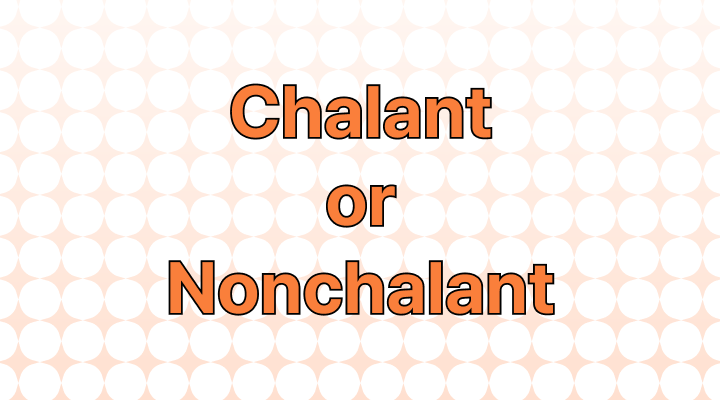"Chalant" is not a word in the English language and is likely a reference to the word "nonchalant," which means indifferent or unconcerned. Because the prefix "non-" means "not," people may incorrectly think that the word "chalant" exists when it, in fact, does not.
An example of a person who is nonchalant would be a coworker who is calm and collected even though she is giving an important presentation in front of a large audience. Most would be nervous to present in front of many people, but the coworker is nonchalant and unfazed.
Here are other words that do not exist but can be mistaken to exist because of another word:
- whelmed (from overwhelmed and underwhelmed)
- kempt (from unkempt)
- sheveled (from disheveled)
- plussed (from nonplussed)
- couth (from uncouth)
There are also words like "charged" and "discharged" that seem as though they could have directly opposite meanings, but they have distinct meanings and are used in completely different situations.
Example sentences
Because "chalant" is not an accepted word in standard English, we provided sentences with "nonchalant" to show how the word is used in context.
- Despite the chaos around her, she remained nonchalant and continued reading her book.
- He casually strolled into the room, looking nonchalant as if he hadn't just won a prestigious award.
- The cat gave a nonchalant stretch before leaping off the windowsill.
- She delivered the news with a nonchalant tone as if it didn't affect her at all.
- He handled the difficult situation with a nonchalant confidence that surprised everyone.
- Even in the face of criticism, he maintained a nonchalant attitude and stayed true to himself.
- She was so nonchalant about her accomplishments that people often underestimated her abilities.
- The chef added a pinch of salt to the dish with a nonchalant flick of his wrist.
- The driver remained nonchalant despite the car breaking down in the middle of the highway.
- His nonchalant response to the unexpected question caught everyone off guard.
Want to sound like a native speaker?
Engram’s AI-powered grammar checker makes your English sound like a native speaker’s, suggesting natural English expressions on top of fixing grammar, spelling, punctuation, word order, and vocabulary.

Reference:














